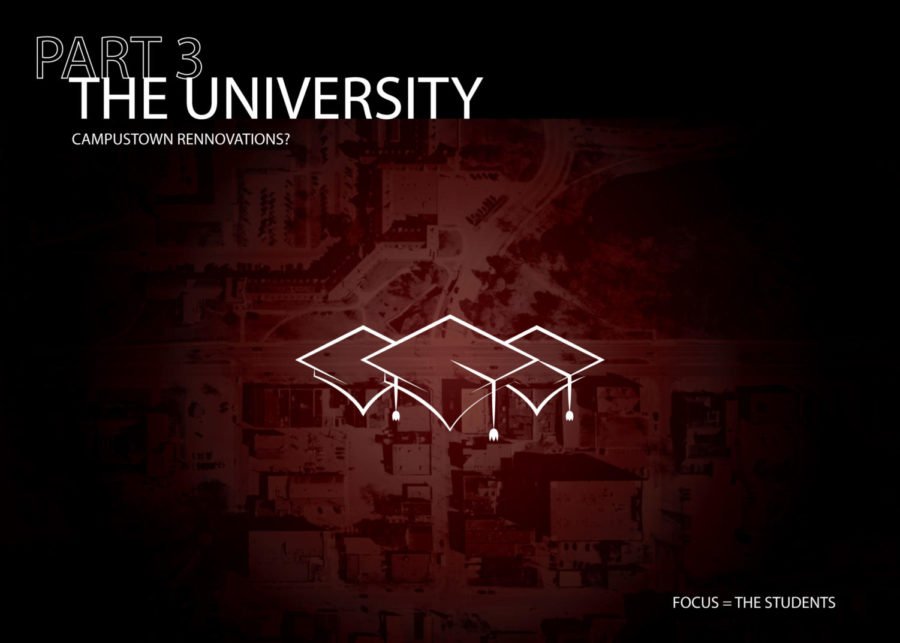Common ground: Iowa State works to effect change to Campustown area
Illustration: Kyle Holcombe/Iowa State Daily
Campustown – The University
January 22, 2012
There once was a time when it was possible to buy a business suit in Campustown. ISU professor Peter Orazem said that when he came back to Ames in 1982, Campustown was the place where faculty would go for lunch or to take guest speakers who came to town.
“It’s been a slow, steady procession toward mediocrity,” said Orazem, professor of economics and Ames City Council member. “It’s so amazingly not reflective of the university. It kind of makes you wonder.”
A complimentary relationship
Vice President for Business and Finance Warren Madden said Campustown is viewed as an asset to the university and a potential recruiting tool.
Nearly 63 percent of respondents to the Campustown Action Association survey agreed that Campustown and the university should have a collaborative relationship — viewing them as “connected and dependent on one another.”
Orazem pointed out that there are thousands of faculty on campus each day — many of whom never cross the street to Campustown as it is today.
Smaller steps
“We tried to be the spark plug, and we just weren’t able to get a developer together,” Madden said.
The university was a major factor in the Lane4 plans because of the potential to be a tenant in new properties.
He said he expects Campustown improvements to come in smaller steps in the future. With the development of the Intermodal Facility and reopening of State Gym, he speculated that traffic patterns might change and developments might begin to the west, rather than right at the corner of Lincoln Way and Welch Avenue.
“We’re willing to sit down and talk with people who have an interest in redeveloping Campustown,” Madden said. “But I don’t think we’ll go back to a Lane4-type big project in the near future.”
Evolving space needs
Madden said there is a continued willingness to talk about moving campus departments off campus. He said the biggest needs are classroom and lab space, while Lane4 was mainly proposing to add office space.
However, some academics have expressed concern about having classes in the Campustown environment.
With continuing high enrollments, needs for student housing also will continue to change. This fall saw students staying in dens and the Towers residence halls full again.
Campus services expanded
“The more aggressive the university is in offering services Campustown was built for, the greater the challenges to Campustown,” said Matthew Goodman, City Council member and owner of several Campustown restaurants, such as Fighting Burrito.
He pointed to the expansion of ISU Dining services, such as Sunday evening meals, as a detrimental factor. Before Sunday evening meals were offered, that was a major business night for Campustown restaurants. Banking services such as CyCash and Dining Dollars also create revenue that students must spend on Campus. Meanwhile, he said part of the reason alcohol dominates Campustown is because it’s one thing the university doesn’t offer.
Madden said that these services were expanded in response to student demands and after conducting research.
“Students vote with their feet and with their pocketbooks about where they want to eat and what services they want on campus,” he said. “Ultimately, students decide where they want to go to school and what kind of services they want based on a variety of factors.”
Departments involved
Campus departments that have a stake in student well-being, including Prevention Services, have taken an active interest in Campustown.
“Overall, we just want to make sure we have a safe, fun environment for students, and that doesn’t just mean on campus,” said Ashley Hunter, graduate assistant with Prevention Services.
Prevention Services aims to reduce high-risk behaviors of students, including binge drinking and sexual misconduct. They believe that the current state of Campustown contributes to these behaviors.
Other campus groups, including Veishea, are also involved or affiliated with CAA.
Student involvement
Tor Finseth, ex-officio City Council liasion and former member of the Government of the Student Body, said that the biggest thing students can do to effect change in Campustown is just let people know it’s still important to them — even if it’s just mentioning to the waiter that it’d be nice to see a cleaned-up place.
Events including Summerfest and Campustown cleanups have drawn hundreds of volunteers. One greek chapter, Alpha Gamma Delta, has made volunteering in Campustown a regular activity.
“When you get the students involved in the area, it generates a lot of word of mouth and a sense of pride in the area,” said Neal Wiebers, GSB representative for Campustown and junior in political science. “I think the direction that we’re moving in is very good, but in five to 10 years I think there will be more student involvement in the area, more green initiatives and overall more pride.”
Chandra Peterson, secretary of CAA and senior in political science, has been involved with Campustown for years.
“It’s part of students’ experiences at Iowa State. It affects peoples’ lives,” she said. “When you leave here, you want students to have just as great of an experience as you had or better.”







